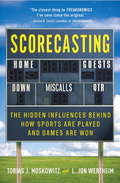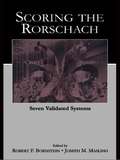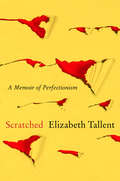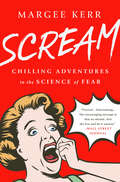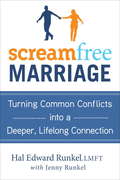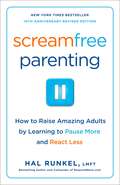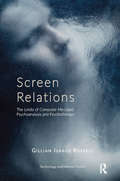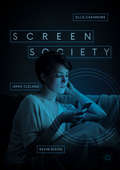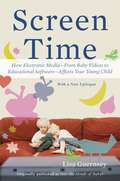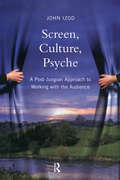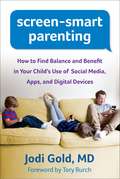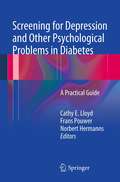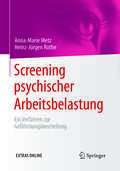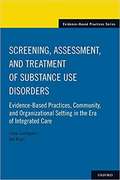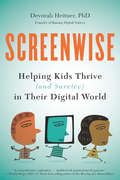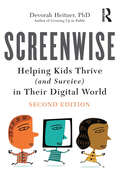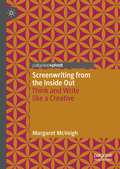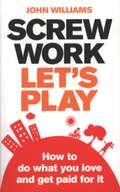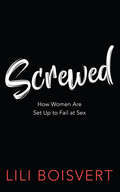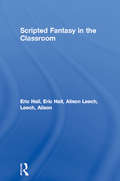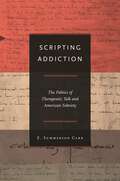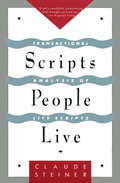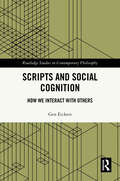- Table View
- List View
Scorecasting: The Hidden Influences Behind How Sports Are Played and Games Are Won
by L. Jon Wertheim Tobias MoskowitzIn Scorecasting, University of Chicago behavioral economist Tobias Moskowitz teams up with veteran Sports Illustrated writer L. Jon Wertheim to overturn some of the most cherished truisms of sports, and reveal the hidden forces that shape how basketball, baseball, football, and hockey games are played, won and lost.Drawing from Moskowitz's original research, as well as studies from fellow economists such as bestselling author Richard Thaler, the authors look at: the influence home-field advantage has on the outcomes of games in all sports and why it exists; the surprising truth about the universally accepted axiom that defense wins championships; the subtle biases that umpires exhibit in calling balls and strikes in key situations; the unintended consequences of referees' tendencies in every sport to "swallow the whistle," and more.Among the insights that Scorecasting reveals:Why Tiger Woods is prone to the same mistake in high-pressure putting situations that you and I areWhy professional teams routinely overvalue draft picks The myth of momentum or the "hot hand" in sports, and why so many fans, coaches, and broadcasters fervently subscribe to itWhy NFL coaches rarely go for a first down on fourth-down situations--even when their reluctance to do so reduces their chances of winning.In an engaging narrative that takes us from the putting greens of Augusta to the grid iron of a small parochial high school in Arkansas, Scorecasting will forever change how you view the game, whatever your favorite sport might be.From the Hardcover edition.
Scoring the Rorschach: Seven Validated Systems (Personality and Clinical Psychology)
by Robert F. Bornstein Joseph M. MaslingExner's Comprehensive System has attracted so much attention in recent years that many clinicians and personality researchers are unaware that alternative Rorschach scoring systems exist. This is unfortunate, because some of these systems have tremendous clinical value. Scoring the Rorschach: Seven Validated Systems provides detailed reviews of the best-validated alternative approaches, and points to promising new paths towards the continued growth and refinement of Rorschach interpretation.The editors set the stage with an extended introduction to historical controversies and cutting-edge empirical methods for Rorschach validation. Each chapter presents a different Rorschach scoring system. A brief history is followed by detailed information on scoring and interpretation, a comprehensive summary of evidence bearing on construct validity, and discussion of clinical applications, empirical limitations, and future directions. A user-friendly scoring "manual" for each system offers readers practical guidance.The systems tap a broad array of content areas including ego defenses, thought disorder, mental representations of self and others, implicit motives, personality traits, and potential for psychotherapy.All psychologists seriously engaged in the work of personality assessment will find in this book welcome additions to their professional toolkits.
Scratched: A Memoir of Perfectionism
by Elizabeth Tallent“Reading Scratched gave me the feeling of standing very close to a blazing fire. It is that brilliant, that intense, and one of the finest explorations I know of what it means to be a woman and an artist.”—Sigrid Nunez, author of The Friend and Winner of the National Book Award for FictionIn a bold and brilliant memoir that reinvents the form, the acclaimed author of the novel Museum Pieces and the collection Mendocino Fire explores the ferocious desire for perfection which has shaped her writing life as well as her rich, dramatic, and constantly surprising personal life.Scratched is an intimate account of the uses a child, and the adult she becomes, will find for perfectionism and the role it will play in every part of her life. Elizabeth Tallent’s story begins in a hospital in mid-1950s suburban Washington, D.C., when her mother refuses to hold her newborn daughter, shocking behavior that baffles the nurses. Imagining her own mother’s perfectionist ideal at this critical moment, Elizabeth moves back and forth in time, juxtaposing moments in the past with the present in this innovative and spellbinding narrative.Elizabeth traces her journey from her early years in which she perceived herself as “the child whose flaws let disaster into an otherwise perfect family,” to her adulthood, when perfectionism came to affect everything. In the decade between 27 and 37, she publishes five literary books with Knopf and her short stories appear in The New Yorker. But this extraordinary start to her career is followed by twenty-two years of silence. She wrote, or rather published, nothing at all. Why? Scratched is the remarkable response to that question.Elizabeth’s early publications secure her a coveted teaching job at Stanford University. As she toggles between Palo Alto and the Mendocino coast where she lives, raises her son Gabriel, and pursues an important psychoanalysis, Elizabeth grapples with the perfectionism that has always been home to her. Eventually, she finds love and acceptance in the most unlikely place, and finally accepts an “as is” relationship with herself and others. Her final triumph is the writing of this memoir, filled with wit, humor, and heart, and unlike any other you will read. Scratched is a brave book that repeatedly searches for the emotional truth beneath the conventional surface of existence.
Scream: Chilling Adventures in the Science of Fear
by Margee KerrShiver-inducing science not for the faint of heart. No one studies fear quite like Margee Kerr. A sociologist who moonlights at one of America’s scariest and most popular haunted houses, she has seen grown men laugh, cry, and push their loved ones aside as they run away in terror. And she’s kept careful notes on what triggers these responses and why. Fear is a universal human experience, but do we really understand it? If we’re so terrified of monsters and serial killers, why do we flock to the theaters to see them? Why do people avoid thinking about death, but jump out of planes and swim with sharks? For Kerr, there was only one way to find out. In this eye-opening, adventurous book, she takes us on a tour of the world’s scariest experiences: into an abandoned prison long after dark, hanging by a cord from the highest tower in the Western hemisphere, and deep into Japan’s mysterious "suicide forest. ” She even goes on a ghost hunt with a group of paranormal adventurers. Along the way, Kerr shows us the surprising science from the newest studies of fear--what it means, how it works, and what it can do for us. Full of entertaining science and the thrills of a good ghost story, this book will make you think, laugh--and scream.
ScreamFree Marriage
by Jenny Runkel Hal RunkelThrough the best-selling ScreamFree Parenting, Hal Runkel showed thousands of parents how keeping their cool can revolutionize their family life. In his groundbreaking new book, ScreamFree Marriage, Runkel now shows couples how learning to stay calm, in the face of common marital conflicts, is the key to creating and enjoying a deep, lifelong connection. Every committed couple strives to hold on to the marriage they envisioned back when they first said "I do"--before the end of the honeymoon phase, before kids, mortgages, health crises, and all life's inescapable issues. But the truth is this: conflict is unavoidable--it's impossible for two people to see every single thing, face every issue, and experience every situation in exactly the same way. What results are couples "screaming" at each other--sometimes literally yelling out loud, sometimes shutting themselves down and shutting their partners out, and sometimes avoiding the issue altogether--none of which leads to the passionate, intimate connection we all crave. In ScreamFree Marriage, Hal introduces some radical new concepts about marriage, teaching couples how to embrace this inevitable conflict as a profound vehicle for strengthening a marriage. Rather than just a source of pain and disagreement, these "Fires of Commitment," as Hal describes them, can actually be the exact experience needed to grow couples into new levels of maturity and intimacy. By simply learning the ScreamFree formula of Calming Down, Growing Up, and Getting Closer, you too can cross through these fires and end up with a closer and more passionate marriage than ever before. Using accessible anecdotes and the disarming humor that readers have come to love, Runkel disproves prevailing marital wisdom, puts couples on a path to "intimate independence" and reveals a whole new, fresh approach to marriage. From the Hardcover edition.
Screamfree Parenting
by Hal Edward RunkelYou Can Start a Revolution in Your Family . . . TonightScreamFree Parenting is not just about lowering your voice. It's about learning to calm your emotional reactions and learning to focus on your own behavior more than your kids' behavior . . . for their benefit. Our biggest enemy as parents is not the TV, the Internet, or even drugs. Our biggest enemy is our own emotional reactivity. When we say we "lost it" with our kids, the "it" in that sentence is our own adulthood. And then we wonder why our kids have so little respect for us, why our kids seem to have all the power in the family.It's time to do it differently. And you can. You can start to create and enjoy the types of calm, mutually respectful, and loving relationships with your kids that you've always craved. You can begin to revolutionize your family, starting tonight.Parenting is not about kids, it's about parents.If you're not in control, then you cannot be in charge.What every kid really needs are parents who are able to keep their cool no matter what. Easier said than done? Not anymore, thanks to ScreamFree Parenting, the principle-based approach that's inspiring parents everywhere to truly revolutionize their family dynamics. Moving beyond the child-centered, technique-based approaches that ultimately fail, the ScreamFree way compels you to:focus on yourselfcalm yourself down, and grow yourself upBy staying calm and connected with your kids, you begin to operate less out of your deepest fears and more out of your highest principles, revolutionizing your relationships in the process.ScreamFree Parenting is not just another parenting book. It's the first parentingbook that maintains--from beginning to end--that parenting is NOT about kids . . . it's about parents. As parents pay more attention to controlling their own behavior instead of their kids' behavior, the result is stronger, more rewarding, and more fulfilling family relationships.For those of you reading who are parents, know parents, or have had parents, the notion that the greatest thing you can do for your children is to learn to focus on yourself may sound strange, even heretical. It's not. Here's why: we are the only ones we can control. We cannot control our kids--we cannot control the behavior of any other human being. And yet, so many "experts" keep giving us more tools ("techniques") to help us try to do just that. And, of course, the more we try to control, the more out of control our children become."Don't make me come up there." "Don't make me pull this car over." "How many times do I have to tell you?" Even our language suggests that our kids have control over us.It's no wonder that we end up screaming. Or shutting down. Or simply giving up. And the charts, refrigerator magnets, family meetings, and other techniques in most typical parenting books just don't work. They end up making us feel more frustrated and more powerless in this whole parenting thing.This practical, effective guide for parents of all ages with kids of all ages introduces proven principles for overcoming the anxieties and stresses of parenting and setting new patterns of connection and cooperation. Well-written in an engaging, conversational tone, the book is sensible, straightforward, and based on the experiences of hundreds of actual families. It will help all parents become calming authorities in their homes, bring peace to their families today, and give kids what they need to grow into caring, self-directed adults tomorrow.
Screamfree Parenting
by Hal Edward RunkelYou Can Start a Revolution in Your Family . . . TonightScreamFree Parenting is not just about lowering your voice. It's about learning to calm your emotional reactions and learning to focus on your own behavior more than your kids' behavior . . . for their benefit. Our biggest enemy as parents is not the TV, the Internet, or even drugs. Our biggest enemy is our own emotional reactivity. When we say we "lost it" with our kids, the "it" in that sentence is our own adulthood. And then we wonder why our kids have so little respect for us, why our kids seem to have all the power in the family.It's time to do it differently. And you can. You can start to create and enjoy the types of calm, mutually respectful, and loving relationships with your kids that you've always craved. You can begin to revolutionize your family, starting tonight.Parenting is not about kids, it's about parents.If you're not in control, then you cannot be in charge.What every kid really needs are parents who are able to keep their cool no matter what. Easier said than done? Not anymore, thanks to ScreamFree Parenting, the principle-based approach that's inspiring parents everywhere to truly revolutionize their family dynamics. Moving beyond the child-centered, technique-based approaches that ultimately fail, the ScreamFree way compels you to:focus on yourselfcalm yourself down, and grow yourself upBy staying calm and connected with your kids, you begin to operate less out of your deepest fears and more out of your highest principles, revolutionizing your relationships in the process.ScreamFree Parenting is not just another parenting book. It's the first parentingbook that maintains--from beginning to end--that parenting is NOT about kids . . . it's about parents. As parents pay more attention to controlling their own behavior instead of their kids' behavior, the result is stronger, more rewarding, and more fulfilling family relationships.For those of you reading who are parents, know parents, or have had parents, the notion that the greatest thing you can do for your children is to learn to focus on yourself may sound strange, even heretical. It's not. Here's why: we are the only ones we can control. We cannot control our kids--we cannot control the behavior of any other human being. And yet, so many "experts" keep giving us more tools ("techniques") to help us try to do just that. And, of course, the more we try to control, the more out of control our children become."Don't make me come up there." "Don't make me pull this car over." "How many times do I have to tell you?" Even our language suggests that our kids have control over us.It's no wonder that we end up screaming. Or shutting down. Or simply giving up. And the charts, refrigerator magnets, family meetings, and other techniques in most typical parenting books just don't work. They end up making us feel more frustrated and more powerless in this whole parenting thing.This practical, effective guide for parents of all ages with kids of all ages introduces proven principles for overcoming the anxieties and stresses of parenting and setting new patterns of connection and cooperation. Well-written in an engaging, conversational tone, the book is sensible, straightforward, and based on the experiences of hundreds of actual families. It will help all parents become calming authorities in their homes, bring peace to their families today, and give kids what they need to grow into caring, self-directed adults tomorrow.
Screamfree Parenting: The Revolutionary Approach to Raising Your Kids by Keeping Your Cool
by Hal Edward RunkelYou Can Start a Revolution in Your Family ... Tonight. Scream Free Parenting is not just about lowering your voice. It's about learning to calm your emotional reactions and learning to focus on your own behavior more than your kids' behavior for their benefit. Our biggest enemy as parents is not the TV, the Internet, or even drugs. Our biggest enemy is our own emotional reactivity.
Screen Relations: The Limits of Computer-Mediated Psychoanalysis and Psychotherapy (The\library Of Technology And Mental Health Ser.)
by Gillian Isaacs RussellIncreased worldwide mobility and easy access to technology means that the use of technological mediation for treatment is being adopted rapidly and uncritically by psychoanalysts and psychoanalytic psychotherapists. Despite claims of functional equivalence between mediated and co-present treatments, there is scant research evidence to advance these assertions. Can an effective therapeutic process occur without physical co-presence? What happens to screen-bound treatment when, as a patient said, there is no potential to "kiss or kick?" Our most intimate relationships, including that of analyst and patient, rely on a significant implicit non-verbal component carrying equal or possibly more weight than the explicit verbal component. How is this finely-nuanced interchange affected by technologically-mediated communication? This book draws on the fields of neuroscience, communication studies, infant observation, cognitive science and human/computer interaction to explore these questions. It finds common ground where these disparate disciplines intersect with psychoanalysis in their definitions of a sense of presence, upon which the sense of self and the experience of the other depends.
Screen Society
by Ellis Cashmore Jamie Cleland Kevin DixonScreens have been with us since the eighteenth century, though we became accustomed to staring at them only after the appearance of film and television in the twentieth century. But there was nothing in film or TV that prepared us for the revolution wrought by the combination of screens and the internet. Society has been transformed and this book asks how and with what consequences?Screen Society’s conclusions are based on an original research project conducted by scholars in the UK and Australia. The researchers designed their own research platform and elicited the thoughts and opinions of nearly 2000 participants, to draw together insights of today’s society as seen by users of smartphones, tablets and computers – what the authors call Screenagers. The book issues challenges to accepted wisdom on many of the so-called problems associated with our persistent use of screen devices, including screen addiction, trolling, gaming and gambling.
Screen Time: How Electronic MediaFrom Baby Videos to Educational SoftwareAffects Your Young Child
by Lisa GuernseyAs a mother, Lisa Guernsey wondered about the influence of television on her two young daughters. As a reporter, she resolved to find out. What she first encountered was tired advice, sensationalized research claims, and a rather draconian mandate from the American Academy of Pediatrics: no TV at all before the age of two. But like many parents, she wanted straight answers and realistic advice, so she kept digging: she visited infant-perception labs and child development centers around the country. She interviewed scores of parents, psychologists, cognitive scientists, and media researchers, as well as programming executives at Noggin, Disney, Nickelodeon, Sesame Workshop, and PBS. Much of what she found flies in the face of conventional wisdom and led her to conclude that new parents will be best served by focusing on "the three C's": content, context, and the individual child. Advocating a new approach to television and DVDs, Guernsey focuses on infants to five-year-olds and goes beyond the headlines to explore what exactly is "educational" about educational media. She examines how play and language development are affected by background and foreground television and how to choose videos that are age-appropriate. She explains how to avoid the hype of "brain stimulation" and focus instead on social relationships and the building blocks of language and literacy. Along the way, Guernsey highlights independent research on shows ranging from Dora the Explorer to Dragon Tales, and distills some surprising new findings in the field of child development. Into the Minds of Babes is a fascinating book that points out how little credible research exists to support the AAP's dire recommendation. Parents, teachers, and psychologists will be relieved to learn positive approaches to using videos with young children and will be empowered to make their own informed choices.
Screen, Culture, Psyche: A Post Jungian Approach to Working with the Audience
by John IzodScreen, Culture, Psyche illuminates recent developments in Jungian modes of media analysis, and illustrates how psychoanalytic theories have been adapted to allow for the interpretation of films and television programmes, employing Post-Jungian methods in the deep reading of a whole range of films. Readings of this kind can demonstrate the way that some films bear the psychological projections not only of their makers but of their audience, and assess the manner in which films engage the writer’s own psyche. Seeking to go beyond existing theories, John Izod explores the question of whether Jungian screen analysis can work for ordinary filmgoers - can what functions for the scholar be said to be true for people without a background in Jung’s ideas? Through detailed readings of a number of films and programmes, John Izod builds on the work previously done by Jungian film analysts, and moves on to contemplate the level of audience engagement. Offering deep readings of films directed by Kubrick and Bernardo Bertolucci, as well as satirical comedy, documentaries and twenty-first century Westerns, the book explores the extent to which they manage to make the psychological impact on spectators that films of a similar kind have done on Jungian writers. The author concludes that the screen texts with the best likelihood of impacting the culture of the audience through their collective psychological force fall at opposite ends of the size and budget range: highly personal documentaries, and the most affecting of mainstream genre movies. This innovative text will be essential reading for psychoanalysts and therapists, as well as students and scholars of film with an interest in understanding how screen products work psychologically to engage the viewer.
Screen-Smart Parenting
by Tory Burch Jodi GoldAs a practicing child psychiatrist and mother of three, Jodi Gold has a unique understanding of both the mind-boggling benefits and the serious downsides of technology. Dr. Gold weaves together scientific knowledge and everyday practical advice to help you foster your child's healthy relationship to technology, from birth to the teen years. You'll learn: *How much screen time is too much at different ages. *What your kids and teens are actually doing in all those hours online. *How technology affects social, emotional, and cognitive development. *Which apps and games build smarts and let creativity shine. *How your own media habits influence your children. *What you need to know about privacy concerns, cyberbullying, and other dangers. *Ways to set limits that the whole family can live with.
Screening for Depression and Other Psychological Problems in Diabetes
by Cathy E. Lloyd Frans Pouwer Norbert HermannsThis book is divided into two main sections, and covers a broad range of issues important for health practitioners to be aware of when caring for people with co-morbid diabetes and depression. Section One of the book contains the overall ideas and the more recent developments in measuring psychological morbidity in people with diabetes. When attempting to identify people with depression or other psychological problems, it is important for practitioners to recognize the limitations of screening as well as its utility. Issues such as the basic principles regarding when and when not to screen, the cultural applicability of tools, different questionnaire formats and key concepts such as sensitivity and specificity of tools, and their positive and negative predictive value, will be considered. In particular there has been increased interest in the concept of diabetes-related distress and several tools have been developed to measure this. There are broad-based measures of distress such as the Problem Areas in Diabetes (PAID) scale, the Diabetes Adjustment Scale (DAS), The Diabetes Health Profile, The Fear of Hypoglycemia Scale, etc. There are also a range of generic quality of life tools which have been used effectively in people with diabetes; for example the Medical Outcomes Survey Short-Forms (SF36, SF12), the World Health Organisation Well-being questionnaire (WHO-5) and the EQ5-D. These tools are important because they measure aspects of psychological well-being that are specifically associated with the experience of having a long-term conditions and so have important implications for both self-care and health care practice. The potential overlap of symptoms of depression and symptoms of diabetes-related distress are considered in this section and the implications for practice discussed. Section Two covers the most commonly used tools that have been used to screen for depression. For each tool considered some information which is easily referred to by the readeris set out in a table which includes details of the authors, time of first use, country where it was first developed, some examples of the questions used, the languages it is available in, data on sensitivity/specificity. Each instrument will then be discussed in terms of its use in research as well as practice, and its applicability in different patient groups, different cultural settings and so on. Guidance on the practical use of each tool is included, and the most popular depression screening tools are focussed on.
Screening psychischer Arbeitsbelastung: Ein Verfahren zur Gefährdungsbeurteilung
by Anna-Marie Metz Heinz-Jürgen RotheArbeitsbedingte psychische Erkrankungen sind in den letzten 10 Jahren zu den häufigsten Ursachen für Fehlzeiten und Erwerbsminderungsrenten geworden. Im Mittelpunkt des Buches stehen die detaillierte Beschreibung eines psychologischen Verfahrens zur qualitätsgesicherten, effizienten und praktikablen Analyse und Beurteilung psychischer Belastungsfaktoren in Arbeitsprozessen. Aus den Ergebnissen werden Hinweise für bedingungs- und personenbezogene gesundheitsförderliche Maßnahmen abgeleitet. Das Instrument hat sich bei Gefährdungsbeurteilungen in Unternehmen aller Größen und Branchen bewährt, es ermöglicht, Schwachstellen in der Gestaltung von Arbeitssituationen zu identifizieren sowie komplexe Beziehungen zwischen Arbeitsinhalt, Arbeitsbedingungen und deren Folgen wissenschaftlich aufzuklären.
Screening, Assessment, And Treatment Of Substance Use Disorders: Evidence-based Practices, Community And Organizational Setting In The Era Of Integrated Care (Evidence-based Practices)
by Lena Lundgren Ivy KrullThere is a clear and pressing need for health professionals, including social workers, to be trained in evidence-based practices (EBPs) in the area of substance use disorders (SUD). The Substance Abuse and Mental Health Services Administration (SAMHSA) and other national organizations and government agencies have all put out reports calling for this vital need, though there remains a significant shortage of properly trained clinicians. The aim of this book is to provide an integrated perspective on addiction treatment on the evidence-base of psychosocial and medication-assisted treatment for substance use disorder. The volume is unique in that it critically examines the evidence base of both psychosocial and pharmacological treatment practices targeting a profession of social work audience. It is also one of few that (1) incorporates evidence both from the United States and internationally, and (2) presents a methodology that permits the authors to systematically review a large number of empirically based studies in an organized and easy-to-read manner. Additionally, the text incorporates a health disparities perspective and describes implementation barriers at the organizational, community, and policy levels. It can be used in policy, human behavior, and clinical practice both nationally and internationall
Screenwise: Helping Kids Thrive (and Survive) in Their Digital World
by Devorah HeitnerScreenwise offers a realistic and optimistic perspective on how to thoughtfully guide kids in the digital age. Many parents feel that their kids are addicted, detached, or distracted because of their digital devices. Media expert Devorah Heitner, however, believes that technology offers huge potential to our children-if parents help them. Using the foundation of their own values and experiences, parents and educators can learn about the digital world to help set kids up for a lifetime of success in a world fueled by technology. Screenwise is a guide to understanding more about what it is like for children to grow up with technology, and to recognizing the special challenges-and advantages-that contemporary kids and teens experience thanks to this level of connection. In it, Heitner presents practical parenting "hacks": quick ideas that you can implement today that will help you understand and relate to your digital native. The book will empower parents to recognize that the wisdom that they have gained throughout their lives is a relevant and urgently needed supplement to their kid's digital savvy, and help them develop skills for managing the new challenges of parenting. Based on real-life stories from other parents and Heitner's wealth of knowledge on the subject, Screenwise teaches parents what they need to know in order to raise responsible digital citizens.
Screenwise: Helping Kids Thrive (and Survive) in Their Digital World
by Devorah HeitnerThe second edition of Screenwise offers a refreshed, realistic, and optimistic perspective on how to thoughtfully guide kids in the digital age. Many parents feel that their kids are addicted, detached, or distracted because of their digital devices. Media expert Devorah Heitner, however, believes that technology offers huge potential to our children—if parents mentor them. Using the foundation of their own values and experiences, parents and educators can learn about the digital world to help set kids up for a lifetime of success in a world fueled by technology. Screenwise is a guide to understanding more about what it is like for children to grow up with technology all around them, and to recognizing the special challenges—and advantages—that contemporary kids and teens experience thanks to this level of connection. In it, Heitner presents practical parenting "hacks": quick ideas that you can implement today that will help you understand and relate to your digital native. The new edition includes updated material and additional strategies for parents and caretakers.
Screenwriting from the Inside Out: Think and Write like a Creative
by Margaret McVeighThis book provides aspiring screenwriters with a practical and informed way to learn how to think and write like a “creative”. It stands apart from, yet complements, other screenwriting “how to” books by connecting the transdisciplinary academic fields of screenwriting, film studies and cognitive psychology and neuroscience. Using a stepped approach, it shows the writer how to understand that how we think, shapes what we write, so that we may write better.
Screw Work, Let's Play: How To Do What You Love and Get Paid For It
by John WilliamsScrew Work, Lets Play will show readers why they will have far greater success, happiness and wealth from playing all day. You're tired of being stuck between boring work that pays and fun stuff that doesn't. You want to be able to do whatever is most fun and exciting for you from day to day, to learn new stuff, to be creative, to express yourself and to do something you actually care about. You want to get paid simply for being you. Screw Work, Lets Play, will show readers why the most successful people in the world do exactly that, just think, Richard Branson, Steve Jobs and Warren Buffet all became billionaires by having fun, and they can too starting right now. This book will help readers discover what they enjoy the most and what playing all day looks like for them. It gives life changing strategies to transform their working lives and reveals the huge variety of ways to get paid and play, not only ensuring more fun, but helping them to increase the amount of money they make.
Screwed: How Women Are Set Up to Fail at Sex
by Lili BoisvertWhen it comes to sex and desire, women are screwed. In film, on the page, in fashion, and in everyday life, women’s desire is routinely shown as subordinate to men’s — when it isn’t suppressed altogether. Lili Boisvert argues that there is one dominant principle behind heterosexual encounters: that desire is a male phenomenon and women are merely its object. To change this alienating system, she contends, we must start by facing it head-on. From clothing to flirting, from our fascination with youth and innocence to the orgasm gap, every aspect of women’s lives is dictated by their status as sex objects. Is it any wonder that they are feeling sexually unfulfilled? In a series of explorations of what desire looks like under patriarchy, Screwed sketches the contours of what could be true sexual liberation for women, inside — and outside — the bedroom.
Scripted Fantasy in the Classroom
by Eric Hall Alison LeechMany teachers have tried simple relaxation techniques in their classrooms and been surprised by their success. This step by step guide to the technique of scripted fantasy shows how the forces of the imagination can be harnessed to improve the social skills and classroom performance of students of all ages and all abilities. It provides sample scripts to get the teacher started, and gives advice on classroom management and on processing the fantasy experience without compromising students' privacy.
Scripting Addiction: The Politics of Therapeutic Talk and American Sobriety
by E. Summerson CarrGaming the language of addiction treatmentScripting Addiction takes readers into the highly ritualized world of mainstream American addiction treatment. It is a world where clinical practitioners evaluate how drug users speak about themselves and their problems, and where the ideal of "healthy" talk is explicitly promoted, carefully monitored, and identified as the primary sign of therapeutic progress. The book explores the puzzling question: why do addiction counselors dedicate themselves to reconciling drug users' relationship to language in order to reconfigure their relationship to drugs?To answer this question, anthropologist Summerson Carr traces the charged interactions between counselors, clients, and case managers at "Fresh Beginnings," an addiction treatment program for homeless women in the midwestern United States. She shows that shelter, food, and even the custody of children hang in the balance of everyday therapeutic exchanges, such as clinical assessments, individual therapy sessions, and self-help meetings. Acutely aware of the high stakes of self-representation, experienced clients analyze and learn to effectively perform prescribed ways of speaking, a mimetic practice they call "flipping the script."As a clinical ethnography, Scripting Addiction examines how decades of clinical theorizing about addiction, language, self-knowledge, and sobriety is manifested in interactions between counselors and clients. As an ethnography of the contemporary United States, the book demonstrates the complex cultural roots of the powerful clinical ideas that shape therapeutic transactions—and by extension administrative routines and institutional dynamics—at sites such as "Fresh Beginnings."
Scripts People Live: Transactional Analysis of Life Scripts
by Claude SteinerWhen Claude Steiner and the late Eric Berne developed the theory of Transactional Analysis, their basic belief that people were born princes and princess, until their parents turned them into frogs” countered the fundamental principle of psychiatry which asserts that emotional and mental distress comes from within. This theory was further developed in Steiner’s book Games Alcoholics Play. Dr. Berne, in What Do You Say After You Say Hello?, acknowledged Steiner’s important role in the analysis of life scripts” which we choose at an early age and which rule every detail of our lives until our death. In Scripts People Live, Steiner expands upon this belief to show that people are innately healthy but develop a pattern early in life based upon negative or positive influences of those around them. Thus children decide, however unconsciously, whether they will be happy or depressed, winners or failures, strong or dependent, and having decided, they spend the rest of their lives making the decision come true. For those who choose a negative script, the consequences can be disastrous unless they make a conscious decision to change. Steiner’s classic in psychological theory, with a new foreword by the author, offers a hopeful and practical analysis so that we all may rewrite our life scripts and lead more meaningful and fulfilling lives.
Scripts and Social Cognition: How We Interact with Others (Routledge Studies in Contemporary Philosophy)
by Gen EickersThis book argues that our success in navigating the social world depends heavily on scripts. Scripts play a central role in our ability to understand social interactions shaped by different contextual factors.In philosophy of social cognition, scholars have asked what mechanisms we employ when interacting with other people or when cognizing about other people. Recent approaches acknowledge that social cognition and interaction depend heavily on contextual, cultural, and social factors that contribute to the way individuals make sense of the social interactions they take part in. This book offers the first integrative account of scripts in social cognition and interaction. It argues that we need to make contextual factors and social identity central when trying to explain how social interaction works, and that this is possible via scripts. Additionally, scripts can help us understand bias and injustice in social interaction. The author’s approach combines several different areas of philosophy – philosophy of mind, social epistemology, feminist philosophy – as well as sociology and psychology to show why paying attention to injustice in interaction is much needed in social cognition research, and in philosophy of mind more generally.Scripts and Social Cognition: How We Interact with Others will appeal to scholars and graduate students working in philosophy of mind, philosophy of psychology, social epistemology, social ontology, sociology, and social psychology.
